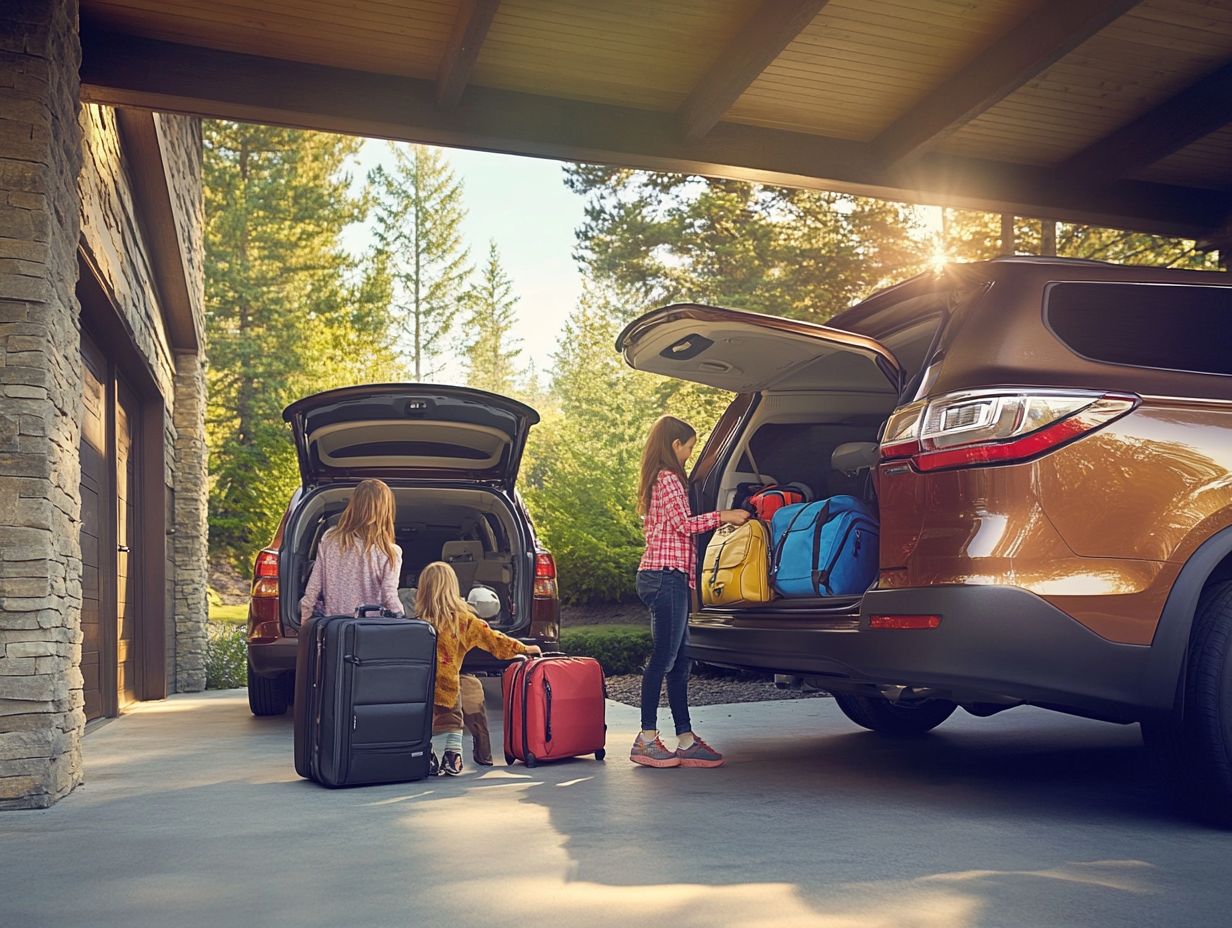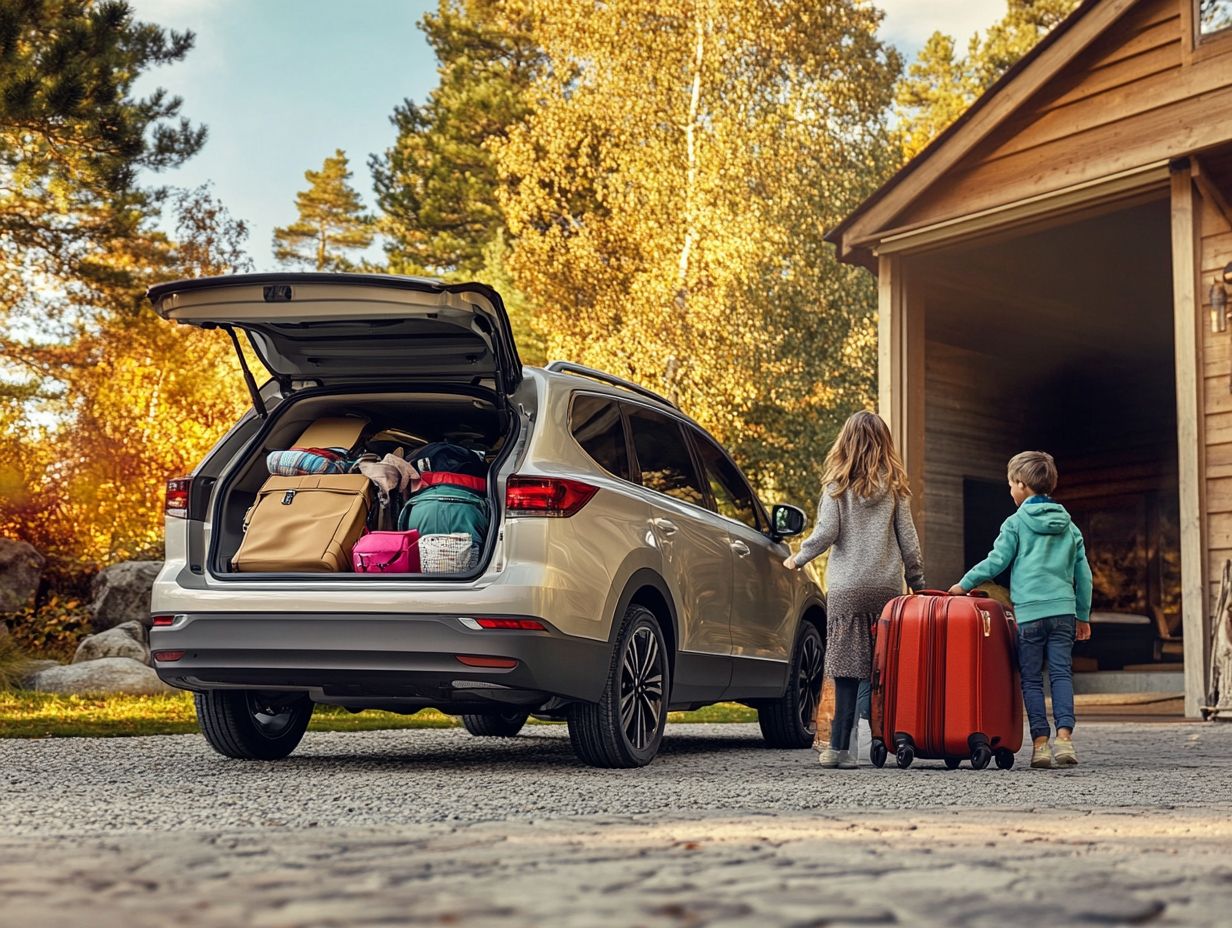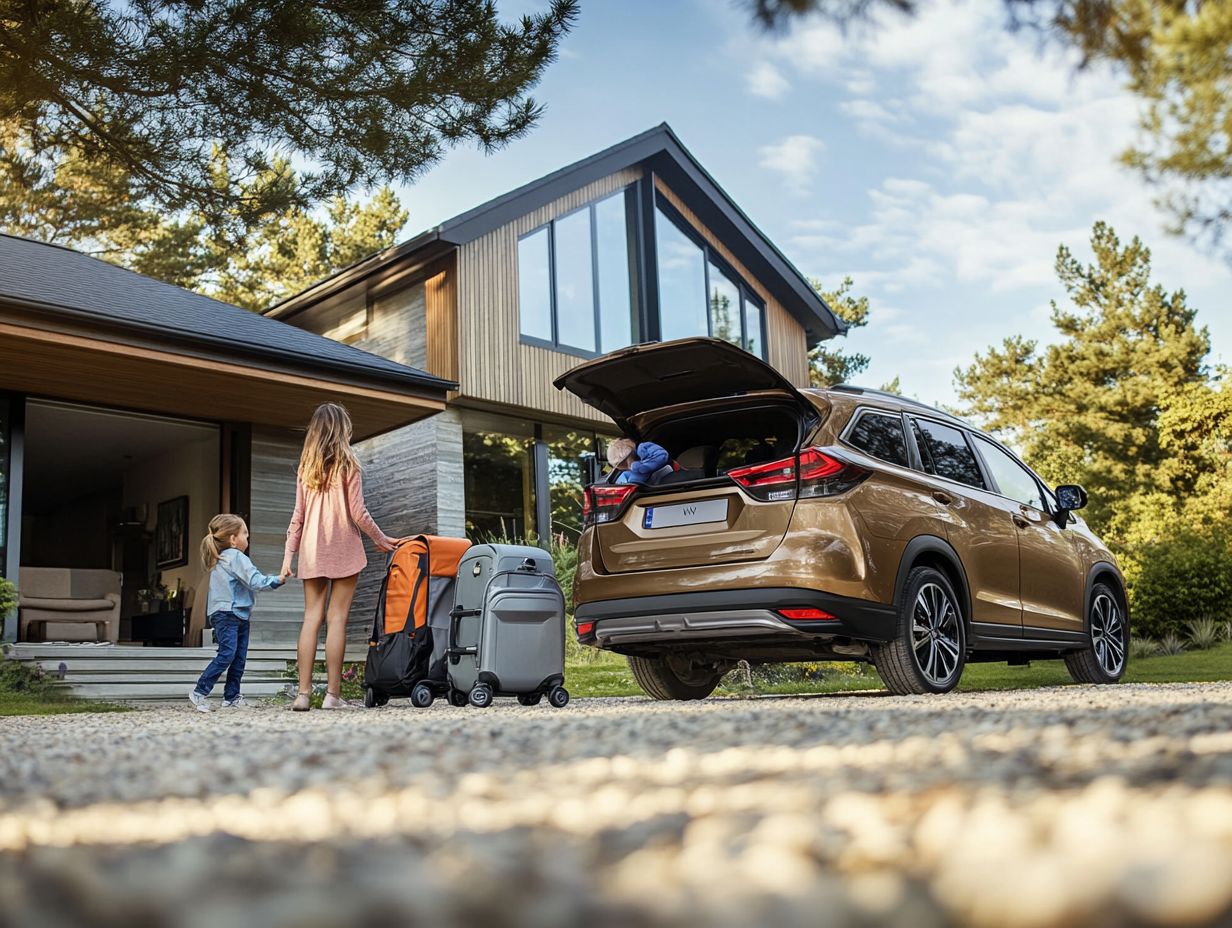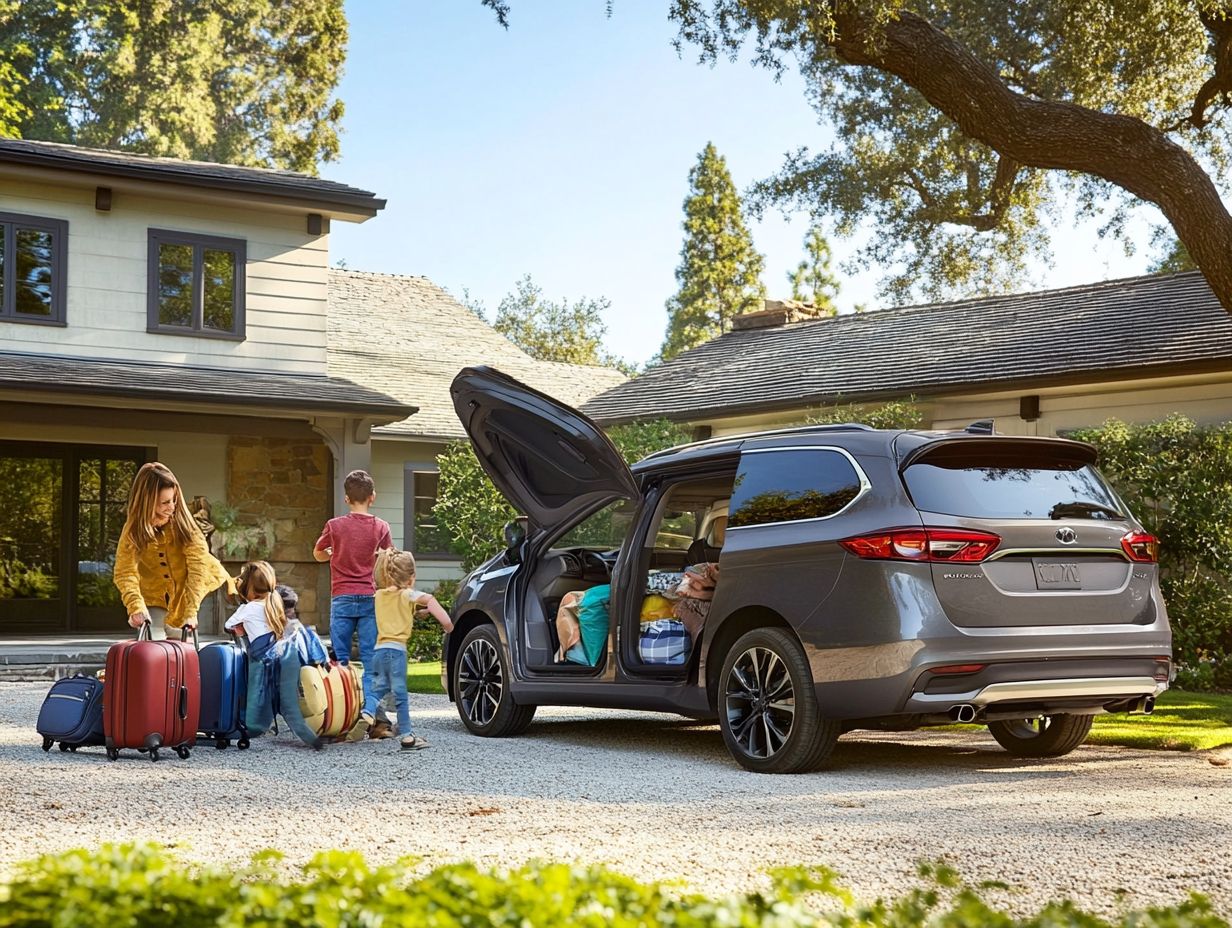Price Comparison: Family SUVs vs. Minivans
When selecting the ideal family vehicle, the discussion between SUVs and minivans often takes the spotlight. Each option presents distinct benefits, and grasping their differences in terms of cost, fuel efficiency, features, and overall value is essential to meet your family’s specific needs.
Let s explore the key factors that will help you choose the right family vehicle! This article will guide you through various aspects, from purchase prices and insurance expenses to comfort and convenience features, helping you determine which vehicle aligns best with your lifestyle and budget.
Contents
- Key Takeaways:
- Cost Comparison of SUVs and Minivans
- Fuel Efficiency and Long-Term Savings
- Features and Amenities
- Which is the Better Value?
- Frequently Asked Questions
- What is the average price difference between family SUVs and minivans?
- Are there any notable cost-saving features in minivans compared to SUVs?
- Do family SUVs and minivans have similar price ranges across different brands?
- Is it more cost-effective to purchase a used family SUV or minivan?
- Are there any costs to consider when comparing family SUVs and minivans?
- Is it possible to negotiate the price of a family SUV or minivan?
Key Takeaways:

- SUVs generally have a higher purchase price compared to minivans, but insurance and maintenance costs may be lower for minivans in the long run.
- SUVs and minivans have varying levels of fuel efficiency, but fuel costs may be higher for SUVs when considering long-term ownership.
- When deciding between a family SUV or minivan, it’s important to consider factors such as comfort, convenience, and standard features to determine which offers better value for your specific needs and budget.
Differences Between SUVs and Minivans
When you re in the market for a family vehicle, understanding the distinctions between SUVs and minivans is vital for making well-informed decisions. SUVs, such as the Yukon XL and Ford Expedition, deliver a robust driving experience, boasting impressive towing capacity and off-roading capabilities.
In contrast, minivans like the Kia Carnival and Toyota Sienna shine in interior comfort and family-friendly features, including sliding doors and spacious third-row seating. Each option carries its unique advantages based on user preferences, making it essential to assess what aligns best with your lifestyle.
Every family’s needs are different, and the design nuances between these vehicle types can significantly influence your driving experience. For example, SUVs provide elevated driving positions and rugged exteriors. Meanwhile, minivans excel in offering ample legroom and clever storage solutions for strollers and sports gear.
Safety features also differ; many SUVs come equipped with systems that help drive on different surfaces, while minivans focus on family-centric innovations, such as rear-seat entertainment systems and enhanced child safety locks. Understanding these factors can dramatically affect your day-to-day usability and overall contentment with your choice.
Cost Comparison of SUVs and Minivans
Cost plays a crucial role when weighing the options between SUVs and minivans. It affects both the initial purchase price and future costs like insurance and maintenance.
By understanding these financial implications, you can make a thoughtful decision that fits your budget, while considering the unique features each vehicle type offers.
Purchase Price
The purchase price of SUVs and minivans can vary significantly. Vehicles like the Yukon XL often command a higher price tag compared to more budget-friendly options like the Kia Carnival. This pricing disparity arises from various factors, including size, brand reputation, advanced safety features, and luxury options.
For instance, high-end SUVs may offer enhanced performance capabilities and sophisticated technology integrations that appeal to families seeking a premium driving experience. On the flip side, minivans focus on practicality and spaciousness, providing generous room for both passengers and cargo without breaking the bank.
As a buyer, you might also want to consider factors like fuel efficiency, resale value, and maintenance costs to determine which vehicle truly aligns with your lifestyle and budget preferences.
Insurance and Maintenance Costs
Insurance and maintenance costs are key factors when comparing SUVs and minivans. These expenses can greatly impact your family’s budget.
To understand these costs, look at the make and model, safety ratings, and the vehicle’s age. Typically, SUVs have higher insurance premiums due to their size and the risks associated with them.
Minivans often have better safety features, leading to lower insurance rates. On the maintenance side, costs can vary widely; SUVs might require pricier parts and repairs, especially those with advanced technology.
Reliability ratings matter too. Vehicles known for durability generally need fewer repairs, helping families save money in the long run.
Fuel Efficiency and Long-Term Savings

Fuel efficiency is crucial in your vehicle ownership journey, especially when weighing SUVs versus minivans. Understanding gas mileage can significantly influence your long-term savings, particularly for families on the go.
By exploring the details of fuel economy in these vehicles, such as the availability of hybrid options, you can make informed choices that balance performance with cost-effectiveness.
Comparing Gas Mileage
When comparing gas mileage between SUVs and minivans, it s important to see how fuel efficiency shapes your driving experience and your budget.
Examining specific models like the Kia Carnival reveals notable differences that could influence your buying decision. Traditional SUVs are often heavier, which can lower their miles per gallon (MPG) ratings compared to the more aerodynamic design of minivans like the Carnival.
Driving conditions also affect fuel economy. Whether navigating city streets or cruising on the highway, these factors can lead to performance variations.
By understanding these aspects, you gain clarity on your fuel expenses and consider the environmental implications of your vehicle choices. Conducting a thorough analysis is essential for making well-informed decisions.
Considerations for Long-Term Ownership
When thinking about long-term ownership of SUVs and minivans, focus on reliability and maintenance costs, as these significantly impact overall cost-effectiveness.
As you evaluate your options, watch the resale value of these vehicles it’s a crucial element in your financial landscape. Generally, SUVs tend to hold their value better over time, making them more attractive if you plan to upgrade later.
Minivans, however, often feature robust construction suited for family needs, leading to a longer lifespan and fewer costly repairs. Remember to consider how maintenance costs may accumulate over the years, affecting your long-term budget.
Ultimately, your ownership experience will depend on your priorities whether you prefer the practicality and spaciousness of a minivan or the rugged versatility of an SUV.
Features and Amenities
When evaluating SUVs and minivans, the features and amenities are crucial in determining which vehicle aligns best with your family’s needs. Comfort, convenience, and safety should be at the forefront of your considerations.
Family-friendly features like adaptive cruise control, impressive safety ratings, and roomy interiors are vital factors to weigh carefully in your vehicle selection process.
Standard Features and Upgrades
Standard features and upgrades can dramatically elevate the interior comfort and functionality of both SUVs and minivans. They cater perfectly to your family’s diverse needs.
For instance, many popular SUV models come packed with advanced entertainment systems, spacious cargo areas, and a multitude of USB charging ports. These features transform long journeys into enjoyable experiences for both parents and kids. You’ll find that features like rear-seat entertainment systems and climate control options, commonly found in minivans, are designed specifically to accommodate larger families.
Minivans often have sliding doors and lower step-in heights. This makes it easier for children to climb in and out. Meanwhile, SUVs often shine with superior towing capabilities that allow you to pull trailers or boats and off-road features. These elements appeal to adventurous families who prioritize versatility in their vehicles.
Comfort and Convenience

Choosing between an SUV and a minivan? Comfort and convenience are key. Let s dive in!
Taking a closer look at the seating configurations can reveal how various designs cater to your unique preferences. Minivans often shine in this department, offering a spacious and versatile layout that adapts to your needs. Features like captain’s chairs enhance personal space, making it a breeze for families to settle in for those long journeys.
Conversely, many modern SUVs lean toward a sporty aesthetic, which might sacrifice a bit of legroom. However, they often exude a luxurious feel. Ultimately, considerations like headroom, material quality, and overall layout are critical in ensuring you and your passengers feel right at home.
Whether you opt for the generous comfort of a minivan or the striking style of an SUV, your experience should always prioritize your comfort.
Which is the Better Value?
Determining which vehicle provides better value between SUVs and minivans involves a thoughtful assessment of several key factors, such as price, features, and personal preferences.
You ll need to carefully consider your specific family needs and weigh them against the benefits each vehicle type presents, from ample cargo space to family-friendly amenities.
Ultimately, whether you choose an SUV or a minivan, make sure it fits your family s unique lifestyle!
Factors to Consider in Making a Decision
When deciding between an SUV and a minivan, consider factors such as your budget, desired features, and personal preferences.
Family size is often a significant consideration. Larger families may find the ample seating and storage options of a minivan particularly beneficial, while smaller families might be drawn to the passenger capacity and rugged charm of an SUV.
Your lifestyle needs also play a crucial role. If you frequently embark on outdoor adventures, you may lean towards an SUV for its off-road capabilities and towing capacity. Conversely, if you navigate urban environments, you might appreciate the ease of entry and exit that a minivan provides.
Moreover, vehicle capabilities like fuel efficiency, safety ratings, and technological features can greatly impact your decision. It s essential to weigh these elements thoughtfully before making your final choice.
Frequently Asked Questions
What is the average price difference between family SUVs and minivans?
Exciting news! The average price difference between family SUVs and minivans is about $5,000! Minivans are often your budget-friendly choice.
Are there any notable cost-saving features in minivans compared to SUVs?

Yes, minivans typically have sliding doors instead of traditional hinged doors. This design can save on production costs and ultimately lead to a lower price for consumers. Minivans also typically offer better fuel efficiency compared to SUVs, which can save families money in the long run.
Do family SUVs and minivans have similar price ranges across different brands?
The price ranges for family SUVs and minivans are similar across many brands. For those considering options, price comparisons for SUVs for city driving show that luxury SUVs can be much more expensive than affordable minivans.
Is it more cost-effective to purchase a used family SUV or minivan?
This depends on your preferences and budget. Used minivans are generally more affordable than used SUVs because of their lower initial price.
Are there any costs to consider when comparing family SUVs and minivans?
Yes, consider the cost of insurance, maintenance, and gas when evaluating the total cost of ownership. SUVs often have higher insurance rates and repair costs, while minivans usually offer better fuel efficiency.
Is it possible to negotiate the price of a family SUV or minivan?
Absolutely! Research the average price for your desired make and model. This knowledge gives you an edge when negotiating!
Seize the opportunity to negotiate the best deal on your family SUV or minivan! Timing can make a big difference, especially at the end of a quarter.






